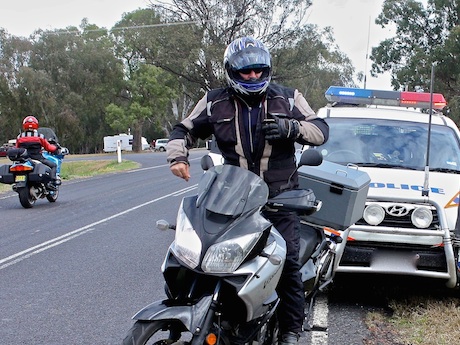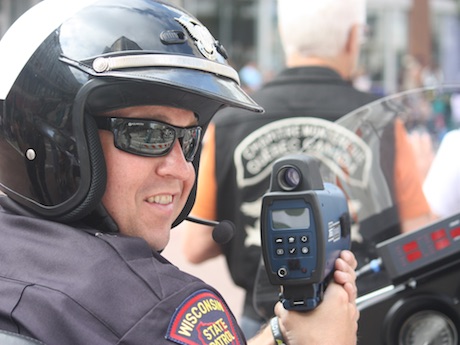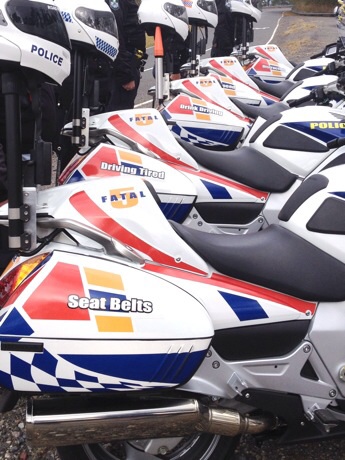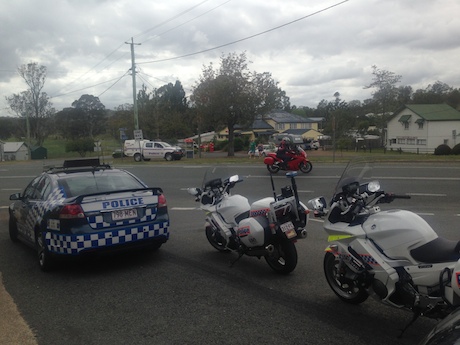There is no guaranteed method for avoiding traffic offences except not committing them.
However, you can use the following “expert” guide to lessen the impact, cop a lesser fine, prevent copping extra fines (such as being pulled over for speeding and ending up with vehicle defect notices as well) or, occasionally, get out of traffic offences.
These 10 tips for motorcycle riders are all gleaned from current and former police officers in Australia, New Zealand, the UK and USA as well as a psychologist who also works with the police.
They are based on the fact that all officers have discretion in handing out fines based on a number of factors. However, zero tolerance crackdowns are diminishing the patrol officer’s ability to make judgments for the good of the community.

2 Sit. Do not get out off your bike or out of your vehicle. This can be seen as a threat to police. Also, don’t go reaching inside your panniers or jacket for your wallet at this stage. Remember, officers are taught operational skills and tactics to look for visual queues of threats. There is currently a heightened state of alert in Australia and police are more aware of their safety than ever. However, you should remove your helmet so the officer gets a good look at your kind and innocent face.
3 Be nice. Police officers have been instructed to be nice and most start out that way with a “Good morning sir/ma’am”. However, what you say next could be the difference between the officer being nice or being nasty. Return the pleasant greeting and smile. Do not swear, argue, or be rude or sarcastic. If you are, then you could end up with more than the fine you were stopped for!
4 Admission. The cops have got you and you know it, so there is no harm in admitting it. This will make the police officer feel more at ease that he doesn’t have to argue with you or face a day in court. However, if you don’t believe you have offended, be careful how you answer their loaded question “Do you have a reason for speeding/running that red light/failing to give way/running over that pedestrian?” If you say no, then you’ve just admitted that you did it! Instead, say “I don’t believe I did (whatever you are accused of)”.
5 Apologise. If it’s a fair cop, apologise, telling the officer it will never happen again. Tell them you had a momentary lapse of reason, judgment or attention.
6 Traffic record. At this time you may also alert them to your impeccable driving record. But don’t lie, because they have computers that will check your driving record in seconds. If your record is good, they may take that into account and lessen the fine or just give you a stern warning.
7 Cry. If you are capable of being emotive, this can and has worked. But you will need a genuine reason to cry. It could be that you have just broken up with your girlfriend, been fired, lost a loved one or are about to cop a massive fine and demerit points you can’t afford! Even if you can’t cry, the officer may view your genuine distress as a mitigating factor.
8 Danger. If you are being chased by crazed maniacs, road ragers, or your crazy landlord, tell the officer. Don’t invent anything. However, you may have been led to believe that those youths in that souped-up Supra had evil intentions toward your bike and you were just trying to get away.
9 Public interest. Remind the officer that yours is a victimless crime and although you know your offence could have caused harm, no one was hurt in any way. Tell them it’s a fair cop, it’s the first time you have done it and that you will never do it again. Police use two tests before deciding whether to issue an infringement notice – the “Sufficiency of Evidence Test” and the “Public Interest Test”. They need good cause to suspect or have evidence to satisfy a court beyond a reasonable doubt that you have committed an offence. Mere suspicion that you have committed an offence is not enough. The Public Interest test is also applied. Take for example, an elderly person detected travelling at just over the speed limit. If they haven’t had a traffic ticket for many years, it could be argued that it is not in the public interest to issue an infringement notice in this case.
10 Recording. All police now have recorders on their uniforms so you are being recorded. If you have a problem with how they conduct themselves, there will be an official record that you can access. You probably also have an action camera recording the incident. Legal experts say you are allowed to video the proceedings, but out of courtesy you probably should advise the officer that you are recording and ask if he/she would like you to turn it off. Tell them you have the camera for “safety reasons”. However, you should also note that if an officer sees the camera is on, you are definitely getting a ticket, so you may consider switching off before the officer gets out of their car or off their bike.
If you really think they’ve got the wrong guy or their equipment is genuinely faulty or they have not conducted themselves properly, you have the right to make a formal complaint about their conduct.
All complaints against police are investigated. If your complaint is upheld, the officer will be disciplined and your fine may or (more likely) may not be revoked. Police keep extensive records of every officer’s “complaint history” and senior police are well aware of officers who gather a lengthy complaint history regarding allegations of incivility and take action to deal with these officers.
As in all walks of life, there are some rogue police. But statistically, most officers do the right thing. They have a difficult and sometimes dangerous job to do. They see the tragic results of traffic crashes on a regular basis, so it’s little wonder that they might start lecturing you.
They are often subjected to verbal abuse, obscene language and even violence. So when they deal with a decent, honest citizen like yourself, they will appreciate it. Being polite, respectful and calm is your best defence.
These are only tips gleaned from people who should know; they guarantee nothing. And, as one officer told me, if it’s a career traffic cop, almost none of the above applies!
(First published January 2015)




